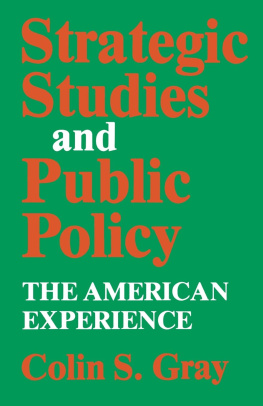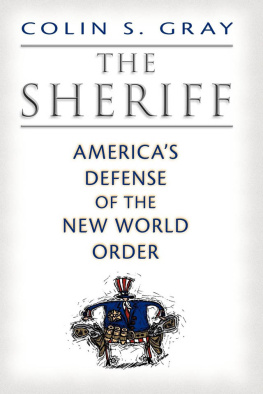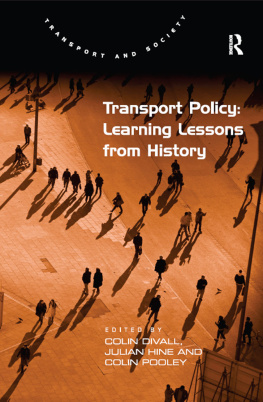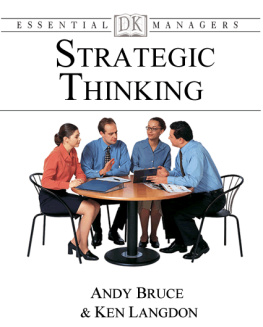Colin S. Gray, Strategic Studies Institute
What Should the U.S. Army Learn From History? The Strategy of the Future through Understanding the Past
Madison & Adams Press, 2017. No claim to original U.S. Government Works
Contact
ISBN 978-80-268-7938-1
This is a publication of Madison & Adams Press. Our production consists of thoroughly prepared educational & informative editions: Advice & How-To Books, Encyclopedias, Law Anthologies, Declassified Documents, Legal & Criminal Files, Historical Books, Scientific & Medical Publications, Technical Handbooks and Manuals. All our publications are meticulously edited and formatted to the highest digital standard. The main goal of Madison & Adams Press is to make all informative books and records accessible to everyone in a high quality digital and print form.
Table of Contents
FOREWORD
What is commonly known as history is really the past, as it is often selected and preserved both by professional historians and by non-specialist citizens. The past is such a large and diverse repository of happenings, thoughts, and experiences that it requires treatment with a disciplined respect. Frequently, respect for the truth about the past is a victim of contemporary circumstance. In this monograph, Dr. Colin S. Gray seeks to explore how historical data might best be used for the benefit of the U.S. Army and, therefore, the United States. He pulls no punches in explaining how challenging it is to penetrate the fog that obscures much of the past. Since the future cannot be foreseen reliably, we are left rather uncomfortably with a seemingly ever changing today.
Despite the difficulties that are soon found by efforts to identify lessons from history, Dr. Gray does believe there are a few major precepts to which respectful attention should be paid. For example, he states and argues in this monograph that the decision to wage war is always a gamble, despite the many advantages owned by the United States in most circumstances. In particular, thinking especially of such unhappy protracted episodes as the conduct of warfare in Vietnam, Afghanistan, and Iraq, the work is impressed by the extent and depth of the American lack of knowledge and understanding of combat zones. The author hopes that this modest study will help American soldiers cope with the huge scope and mass of potential data from the relevant past.
DOUGLAS C. LOVELACE, JR.
Director
Strategic Studies Institute and
U.S. Army War College Press
ABOUT THE AUTHOR
COLIN S. GRAY is Professor Emeritus of International Politics and Strategic Studies at the University of Reading, England. He worked at the International Institute for Strategic Studies in London, England, and at the Hudson Institute in Croton-on-Hudson, New York, before founding the National Institute for Public Policy, a defense-oriented think tank in the Washington, DC, area. Dr. Gray served for 5 years in the Ronald Reagan administration on the Presidents General Advisory Committee on Arms Control and Disarmament. A dual citizen of the United States and the United Kingdom, he has served as an adviser to both the U.S. and British Governments. His government work has included studies of nuclear strategy, arms control, maritime strategy, space strategy, and special forces. Dr. Gray has written 29 books, including: The Sheriff: Americas Defense of the New World Order (University Press of Kentucky, 2004); Another Bloody Century: Future Warfare (Weidenfeld and Nicolson, 2005); Strategy and History: Essays on Theory and Practice (Routledge, 2006); Fighting Talk: Forty Maxims on War, Peace and Strategy (Potomac Books, 2009); National Security Dilemmas: Challenges and Opportunities (Potomac Books, 2009); The Strategy Bridge: Theory for Practice (Oxford University Press [OUP], 2010); War, Peace and International Relations: An Introduction to Strategic History, 2nd Ed. (Routledge, 2011); Airpower for Strategic Effect (Air University Press, 2012); and Perspectives on Strategy (OUP, 2013), which is the follow-on to Strategy Bridge. The final volume in the Strategy Bridge trilogy, entitled Strategy and Defence Planning: Meeting the Challenge of Uncertainty, was published by OUP in 2014. Dr. Gray is a graduate of the Universities of Manchester and Oxford.
SUMMARY
This monograph examines the potential utility of history as a source of education and possible guidance for the U.S. Army. The author considers the worth in the claim that since history (more accurately termed the past) is all done and gone, it can have no value for today as we try to look forward. This point of view did not find much favor here. The monograph argues that although history does not repeat itself in detail, it certainly does so roughly in parallel circumstances. Of course, much detail differs from one historical case to another, but nonetheless, there are commonly broad and possibly instructive parallels that can be drawn from virtually every period of history, concerning most circumstances.
An argument that finds very little favor here is that attracted to claims for the value of assertions of historical analogy. This monograph suggests that the strict requirements for detailed evidence that is required for credible claims of analogy are effectively impossible to meet. Since it can be important not to lose all grasp of the comparison, the ideaperhaps the habit of claiming historical analogy should be dropped. Instead, a much more useful concept that avoids the error of foolish analogy is the idea of the historical parallel. The parallel claim conveys the core of the analogical one, while expediently saving us from the need to try to make claims that are bound to exceed the accessible evidence.
We explore and carefully consider the popular idea expressed by writer L. P. Hartley half a century ago that the past is a foreign country. This idea is important and remains quite popular, but it does not withstand careful criticism. Controversially, I am sure this monograph, though recognizing and welcoming much change in world affairs, is unconvinced that truly major themes in human political and spiritual life have altered significantly over the centuries. While nearly all of the detail and what may be termed dismissively as the decorative and even mechanical features of private and public life have changed greatly over the past 2 centuries, the values of morality, politics, and the connections between effort and reward, have not really altered at all. For a leading example, the standard and traditional formula of ends, ways, and means (and assumptions) works for the interpretation of all cultures, in all periods of history. The reason is because the interdependence of the four vital ideas, at all times and in all circumstances, enjoys the rare status of being a truth for the whole human race, and it is an important key for unlocking the details of many disparate civilizations.
The analysis here is not unfriendly to the idea of change, but it is unimpressed with many claims for alteration that are not, in fact, evidence of radical improvement. Unsurprisingly, perhaps, relatively little with the highest value for human life is found to have changed over a long passage of time. By way of empirical evidence for this argument, the aspirations and achievements, as well as many of the crimes, as we might choose to label them, continue to make sense to us. It is impressive that three of the four greatest books on war, statecraft, and strategy were written millennia in the past, while the most outstanding book on land warfare, by Carl von Clausewitz, was first published 184 years ago.









